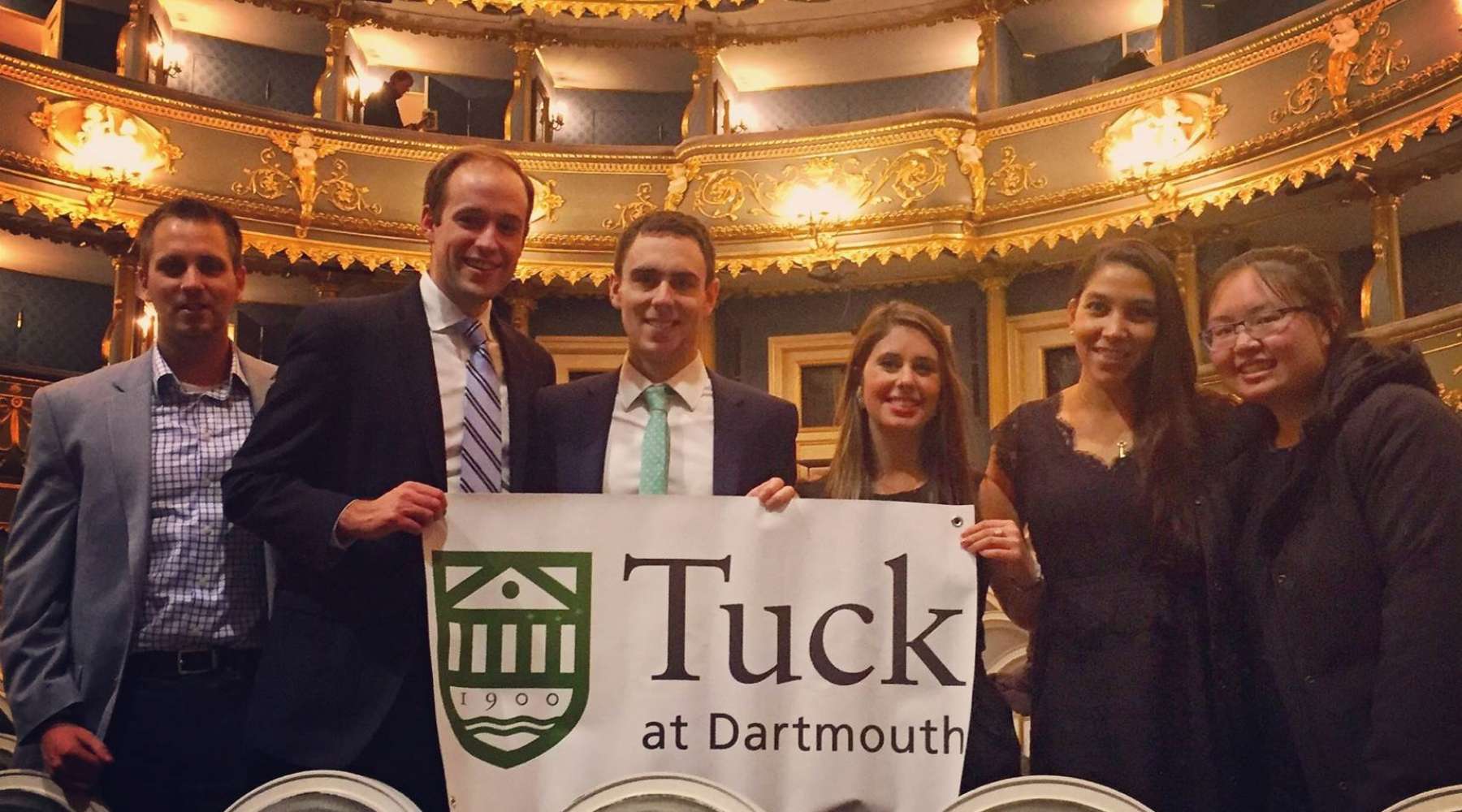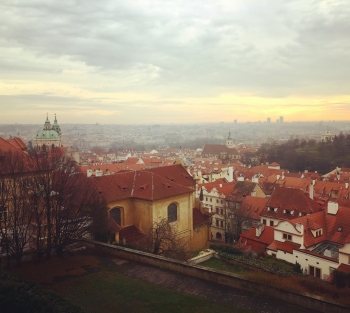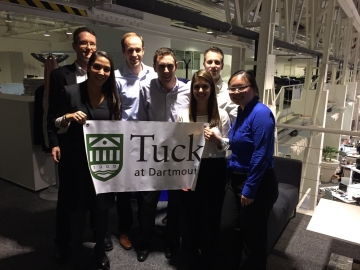
By Giuliana Vetrano T’16
To me, the definition of education is an experience that makes you think differently about something you thought you understood. That’s why I view the three weeks I spent in Prague this December as a keystone of my Tuck education. Having just completed my OnSite Global Consulting project, I’ll never think about Europe—or newspapers—in the same way.
This winter, I was part of a team of six Tuck second-year students working with a leading Czech media company. We had the privilege of living and working in Prague during the long winter break afforded by Dartmouth’s quarter system. The company, which publishes the country’s top publication in its  sector as well as several related magazines, asked us for advice on increasing digital revenues—from advertising, subscriptions, and other (potentially more creative) sources.
sector as well as several related magazines, asked us for advice on increasing digital revenues—from advertising, subscriptions, and other (potentially more creative) sources.
At first, the question seemed simple—not far off from a case interview prompt—but once we were on the ground in Prague, it got a lot more complex. To begin with, the experts we interviewed in the media industry kept telling us that this was a business problem that no one had solved. Sure, maybe the New York Times was profitable, but with only about a two percent margin. And they were leading the market.
Recognizing this, we approached our work as an exercise in ascertaining best practices in media—in the U.S. and beyond—and then deciding whether or not those could be applied to our Czech client. This meant that we needed to couple our external research with an in-depth understanding of our client and its operations. Our interviews with everyone from advertising directors, to editors, to data analysts, to the CEO were some of the most fascinating and rewarding parts of the project.
The project also made me think deeply and carefully about the role media plays in society. Surely many of us take our 24/7 access to true, unbiased news for granted. And as much as we love reading analysis pieces in the Economist or literary pieces in the New Yorker, we still hesitate when we see the high price tag on the subscription. With the decline of print, almost all our beloved sources of information are struggling to survive. But the human need for quality content—whether “quality” is defined as eloquence, timeliness, integrity, relevance, or entertainment—remains. If online advertising and digital subscriptions and paywalls can’t be relied upon to fund journalism, then the media business model is poised for a fundamental shift.
 This problem is particularly interesting in the context of the Czech Republic. There, trusted sources of information are difficult to divine. Most newspapers and magazines are privately owned either by powerful politicians or the wealthy. The public news media (one can think of it as equivalent to the BBC in the U.K.), on the other hand, bears associations with the pre-1989 Communist state. As we learned, Czech readers are loyal to their papers of choice, but also very cognizant of a potential slant in what they read.
This problem is particularly interesting in the context of the Czech Republic. There, trusted sources of information are difficult to divine. Most newspapers and magazines are privately owned either by powerful politicians or the wealthy. The public news media (one can think of it as equivalent to the BBC in the U.K.), on the other hand, bears associations with the pre-1989 Communist state. As we learned, Czech readers are loyal to their papers of choice, but also very cognizant of a potential slant in what they read.
All that being said, the Czech Republic we visited impressed us profoundly, and made us almost embarrassed by our expectations coming in. For one, we were told that this wasn’t Eastern Europe, this was Central Europe, and the old convention of talking about different sides of the curtain was truly passé. The city itself also operated at the level of many other Western European cities I’ve visited. We were struck by the beauty of Prague—not just in terms of the red roofs and pastel facades and the majestic medieval castle, but by the new, modern construction in the neighborhood where we worked. The city was vibrant and dynamic, the people welcoming and spirited, and we all remarked on how at home we felt so quickly. Despite the client’s assertions that the Czech Republic was two or three years behind the U.S. in terms of digital technology and adoption, we were amazed by how many of the best practices we identified were already in place at the company.
Hanover may be one of the world’s greatest environments for learning (I certainly think so), but we Tuckies are just as lucky to have opportunities like this to test what we’re taught in the classroom—not just in the American “real” world, but also in worlds we don’t yet know. For many Tuck students, Europe may seem like a “known,” a destination traveled at younger ages, the first frontier of our international discovery. But this trip to Prague reminded me of the immense cultural diversity and history in that (relatively) small continent, and reinforced how important it is to discover new nations and peoples and histories one at a time, resisting the urge to generalize or assume. At the same time, working in the Czech Republic showed me that business itself has many universal components, and has inspired me to seek out more opportunities to work and live abroad in my career.
I am very grateful to Tuck, my five team members, and our advisor for this rich and fulfilling experience. And in the future, I won’t think twice about renewing my subscriptions.
 Giuliana is a second-year student at Tuck. She started her career as a history and French teacher in private schools in Connecticut before transitioning to digital marketing on the agency side in New York. After Tuck, Giuliana will join Bain & Co. as a consultant in the Boston office.
Giuliana is a second-year student at Tuck. She started her career as a history and French teacher in private schools in Connecticut before transitioning to digital marketing on the agency side in New York. After Tuck, Giuliana will join Bain & Co. as a consultant in the Boston office.
(Featured in above: Jason Tinder T’16, Michael Alemany T’16, Joe Brown T’16, Giuliana Vetrano T’16 (contributor), Molly Hinton T’16, Alice Feng T’16. Photo by Stephen Pidgeon, faculty advisor.)